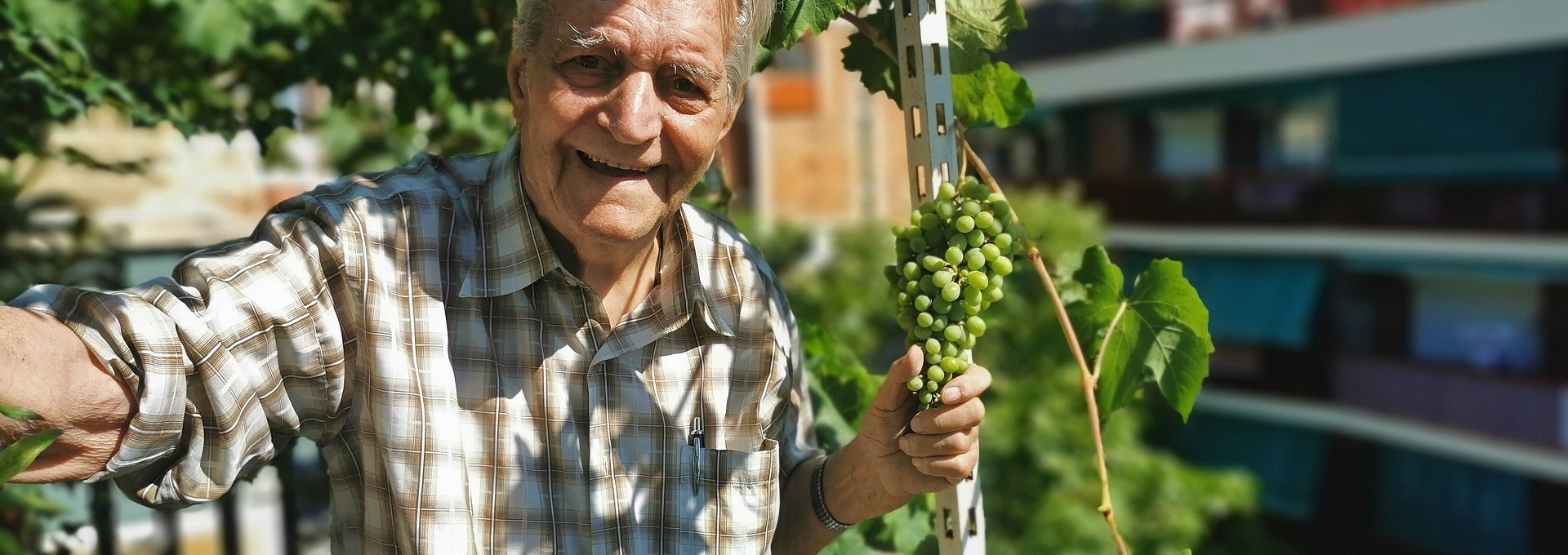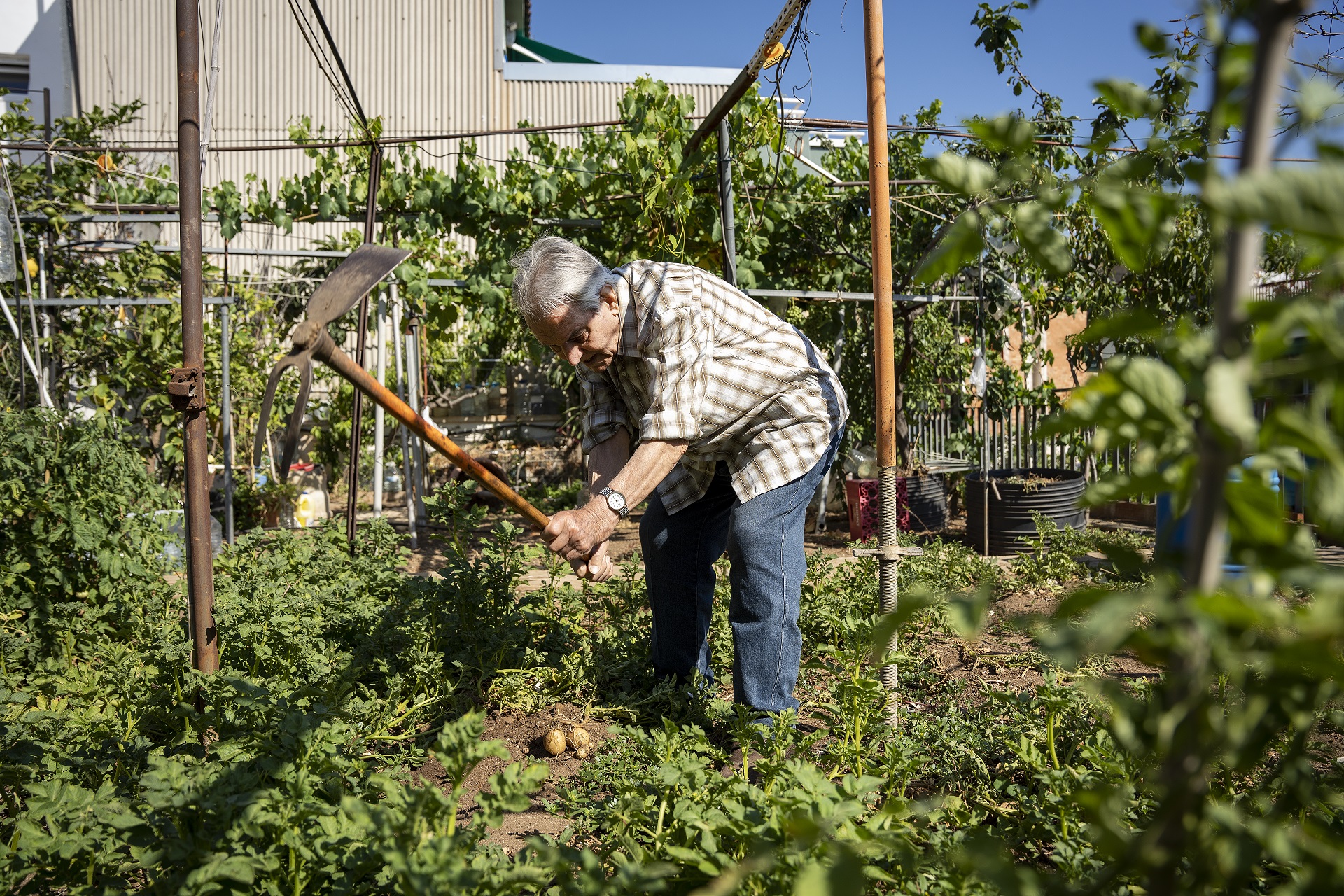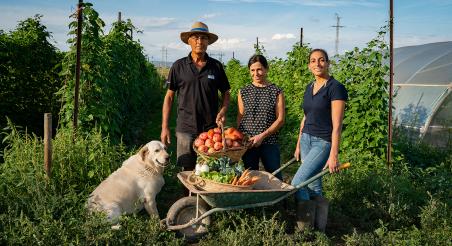Joan Carulla (Juneda, 1923) is a tireless urban farmer. With his 100th birthday just around the corner (his birthday is in May), he still lives alone and is positively glowing with energy as he tends his kitchen garden set on the rooftop of a block of flats in Barcelona’s Horta-Guinardó district. His sons are there for him when he needs them, but he still leads an independent and autonomous life. A pioneer in edible rooftops, and a vegetarian (both out of conviction and on health grounds), he’s currently writing his memoirs, due to be published in the near future.
Carulla’s urban kitchen garden is proof that green cities are possible. He exudes wisdom and sensitivity as he discusses his proposal for the greening of the city blocks in Barcelona’s Eixample district. Joan has a trait which he considers a virtue: even when he’s taking a break, his mind is always on the go, constantly searching for solutions to his concerns. Growing up in a family of modest means taught him to sharpen his focus when it came to undertaking business projects, which is how he ended up carving a niche for himself in the supermarket sector. However, our conversation revolved around his twin passions, namely history and urban kitchen gardens.
Greening Barcelona
Green fills this ecologist’s living room, not to mention the window overlooking his terrace, overflowing with plants tended just as carefully as the kitchen garden we visit later on. Before that, though, we stop to peruse his reading material for different moments of the day, stacked on the side table next to his armchair in the living room, facing a collection of photographs, some of family members and some of friends, such as the naturist Antoni Gallego Calaf, a pioneering ecologist in Spain whose autobiography Carulla helped to publish. Joan himself is one of Spain’s most seasoned ecologists and naturists. «The ecological movement was started in 1969 by five or six people, all older than me and dead now,» he recalls. «At that time, no one was talking about ecology, pollution, overpopulation… Or about the danger of arithmetic food supply growth and exponential population growth,» he adds. Back then, the group would visit schools and give talks, sharing all the information it could get its hands on – which was not exactly plentiful, Joan says.
Seated in his living room today, Joan Carulla is wearing a navy-blue check flannel shirt and a dark-coloured gilet with pockets to hold small gardening tools. One of his sons, Antoni, lives just around the corner with his wife, and the couple are at the beck and call of this quintessential happy farmer.
Joan is always keen to spread love. He says he gets nothing out of being angry, whereas he finds it extremely useful to channel his energy positively. It’s something he first sensed as a child and it could well be the key to his happiness today. He’s always coming up with (and trying out) new projects. At 99 years old, when merely walking would be a challenge for lots of people, he’s still tending his urban kitchen garden, as well as keeping up with his reading and writing, striving to retain the natural and social knowledge he’s acquired over the years. Moreover, he was recently honoured with an award from the Replantem (Replanting) association: a small wood and copper trowel that symbolises his contribution to the establishment and growth of urban kitchen gardens. His pleasure at receiving the award is patent: it takes pride of place in his living room, which is the busiest room in his flat judging by the number of visitors he gets.
Passion for the land
The earth has always been particularly close to Joan’s heart. The fact that he was born in Les Garrigues (in the Catalan province of Lleida) is an important contributing factor to his love for agriculture. He grew up in a family that struggled to make ends meet, with no running water or electricity in a house with very few doors. «I was brought up on boiled potatoes. We only ate eggs when the hens laid them,» he says, adding that he was a vegetarian as a child out of necessity but that he remains one today out of conviction.
Although the earth lies buried under the cement in the city of Barcelona, there’s plenty of it on the rooftop of the block of flats where Joan lives, thanks to an initiative of his to waterproof the terrace with a double asphalt membrane in order to set up a kitchen garden there. In fact, the lack of earth for farming is what led Joan to up sticks and leave his hometown. He fondly describes how he and his wife got married at five o’clock in the morning, one hour before they had to catch the train to Barcelona, where they would build their new life together. Although the wedding reception was a somewhat meagre affair consisting of just a few orelletes (flat, round dough cakes made from flour, milk sugar and aniseed), the occasion was imbued with the elation of two people who’d just tied the knot.
«You’d work yourself to the bone in farming,» Carulla recalls. Back then a kilogram of sugar was equivalent to the daily wage of a male farm labourer, while women were paid half of men’s wages. «When you’ve suffered so much at a young age, you sharpen your focus; you learn what time and money are worth,» he asserts. His family opened a grocery store in the town of Juneda (Lleida) and Joan worked there on his bicycle as a delivery boy.
«I was brought up on boiled potatoes. We only ate eggs when the hens laid them» Joan Carullla
Love towards plants
Once he settled in Barcelona, Joan applied the knowledge he’d gained in his hometown and, albeit with the nerves of a first-time businessman, opened a supermarket on the ground floor of the street where he lives, Carrer Navas de Tolosa. He and his wife had two sons: Antoni, the elder son, eventually took over the running of the supermarket, while Joan, the younger son, became a doctor. With his work as a supermarket owner and as a representative of the guild of food retailers, Joan already had enough on his plate, but one fine day he decided to turn his annoyance with the city council (which wouldn’t let him build where he wanted to) into a passion for plants and earth. He came up with, and executed, the idea that has brought him so much joy: the urban kitchen garden that still graces the roof of his building.
«Ever since I was a child, I’ve enjoyed thinking things over, it’s never been a chore,» he explains. While classmates and colleagues enjoyed other «less useful» hobbies, he’s always devoted his time to thinking about schemes and improving processes. «When I’m lying awake, unable to sleep, I’m actually working, because I’m turning things over in my head,» he says. The need to regreen our cities is a matter he’s given a lot of thought to, long before it began to be considered as a measure to combat climate change. Sometimes it’s not necessary to design new proposals but rather to revive old ideas, such as the ambitious plan designed in 1860 by Ildefons Cerdà, the famous Osona-born engineer and urban planner, for the extension of the city of Barcelona (the Eixample district). «We have to implement the Cerdà Plan, the 10,000 m2 city blocks with chamfered corners and interior patios, providing shade in the summer and sunlight in the winter,» Joan explains, before referring to a recent article by the journalist Carlos Fresneda, who highlights one of the city’s other major advantages: «67% of the rooftops are flat», which means that using them to plant gardens, kitchen gardens and green areas could cool down roofs exposed to the sun, while at the same time helping to mitigate the effects of climate change. Carulla’s words and references allows us to imagine Cerdà’s Barcelona of city blocks, but with Japanese-style interiors. His idea is to invite companies who have warehouses or parking facilities in these blocks to waterproof their roofs in order to plant vegetation there, thus creating an authentically green Eixample district that’s also respectful of the companies who have their premises there.
Joan Carulla’s mind is constantly on the go. He might suddenly wonder why there are so many mosquitos in Barcelona. The answer comes to him in a flash, as clear as day: it’s because of the stagnant water that accumulates in the dishes under the plant pots. He leads us to the terrace next to his living room to show us his solution: he’s filled the dishes with soil so that stagnant water (a breeding ground for mosquitos) can never accumulate there. As we stroll among the plants of this exuberant terrace, Joan explains that he used to grow tomatoes there but that it’s no longer possible due to climate change. He adds that a couple of medlar trees have recently died, reasoning that they were probably having to compete for carbon dioxide with two more recently planted specimens. «The animal kingdom exists thanks to the plant kingdom. Plants need carbon dioxide and give us oxygen. We’d all be dead without them. They purify the air and water and clean up the atmosphere,» he says.
This urban farmer takes his health very seriously and in this respect he could serve as an example to follow for many people. Apart from maintaining a good diet (as we walk through the kitchen, he points to a loaf of wholemeal bread as one of his health allies), he’s tried to take as little medication as possible. Even so, his life has not been without illnesses and he’s always followed the good advice of a few trusted doctors. He had Covid-19 last summer but thankfully came through it unscathed.
«The animal kingdom exists thanks to the plant kingdom. Plants need carbon dioxide and give us oxygen. We’d all be dead without them» Joan Carulla
A vegetable garden at six stories of height
Finally, Joan grabs his walking stick and heads to the lift, ready to show us the jewel in his crown: the rooftop kitchen garden. Once we get to the top floor of the building, he proves that he’s still got enough stamina to climb the 20 steps up to the rooftop. He makes no bones about the fact that his son helps him out with the kitchen garden these days; tending such a wide variety of plants is no easy task, not even in the winter when it entails slightly less work.
The first surprise is when you step on the loose earth: real earth, six floors up! Then there’s the grape vine structure that Joan has set up on the roof. We stop to admire the engineering system he’s designed using recycled material to prevent pigeons from eating his bunches of grapes: he uses plastic bottles to encapsulate and protect the grapes, resembling modern bar lamps. Then he shows us some lemon, olive and fig trees, along with an apricot tree that’s been affected by the drought. The garden isn’t as lush as at other times of the year but there’s still a high level of agrobiodiversity.
He checks on the rainwater storage tanks with satisfaction as he explains that half the garden is made up of recycled organic matter (leaf litter, old invoices, newspapers, ripped-up cardboard boxes, fruit crates, and even pieces from wooden shutters), which he places there with the help of his son Antoni – «I’m lucky to have him,» he acknowledges. «This organic matter is then processed by the microfauna,» he says with a twinkle in his eye. For someone who runs a supermarket, making the most of resources for a kitchen garden comes with the territory.
This edible garden has brought a lot of joy to Joan, who claims he once grew a 950-gram potato there! While we’re chatting on the rooftop, his phone rings: «Grandad, how are you?» He replies that he’s fine but that he has visitors and will call back later. It seems that he has a devoted family.
However, it’s not all a bed of roses in Joan’s kitchen garden. One of the most harmful effects of climate change is drought and at least eight fruit trees have died because of it. That’s why water reuse is crucial, and Joan takes pride in utilising rainwater for eleven months of the year – he only uses the municipal water network in the hottest month of the summer. The excellent system designed by Joan for capturing and storing rainwater comprises various 500-litre tanks, both up on the rooftop and on the terrace of his flat. However, although Joan gets on well with his neighbours, the difficulties of living in the city are plain to see: if additional storeys are built onto either of the adjoining blocks of flats, Joan will lose sunlight and his quality of life will consequently be affected.
At almost 100 years old, Joan retains an extremely sharp memory and gets worked up when he recalls the injustice of the Spanish Civil War and its victims. It remains vivid in his memory, as do many of the events that marked his early life. He survived the war in his hometown, but then had to leave for Barcelona in search of the earth he so longed for. Fortunately, over time, he’s been able to fulfil one of his dreams and now owns several plots of land in Juneda, where he plants wheat and corn.
If Joan were to look back, he could feel enormously proud of his life journey. But Joan is someone who always looks ahead. As we say our goodbyes, we chat about his memoirs, one of the projects he’s most enthusiastic about at the moment.
— BCN Smart Rural Editorial —




